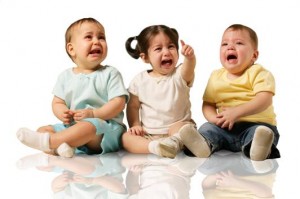Often after a miscarriage there is a great deal of focus on our physical wellbeing and recovery but little focus on coping with miscarriage on an emotional level but this is critical to both understand and action if we are to fully recover.
As young children, we are often taught to hide our emotions, or alternatively we are shamed and ridiculed when we do express them. When we are sad we are told to ‘cheer up’ or ‘look on the bright side’, when we are angry we are told to ‘calm down’. Boys are told that they are weak if they cry and girls are told that they are unladylike if they get angry. As we grow up we are told not to be so emotional, not to be so sensitive, to ‘forgive and forget’ – to do anything other than acknowledge that we are actually experiencing an emotion.

As children we are rarely taught about emotions...
Hiding our emotions does not mean they don’t exist. Each of us has a limited capacity to hold back any particular emotion. When our emotional ‘storage facilities’ become full, the excess tends to show up in uncontrolled bursts of that particular emotion, often at the worst possible time.
There are six basic emotions: joy, peace, love, anger, sadness and fear. All other emotions flow from these basic six. For example, frustration is a form of anger and nervousness stems from fear.
We tend to label the first three emotions good and the others bad, but they are not good or bad and they each have an important place in our lives. The challenge, as we learn and grow from our experiences, is to master our emotions. Then, instead of allowing them to control us, we are able to experience and express them when we choose to, at the right intensity for the given situation.
An important point we must acknowledge on the path toward healing is that our emotions are very real. They are an energy force that needs to be released, regardless of what is socially acceptable. We need to find safe ways to get them out instead of bottling them up. Ignoring them just means pushing them deeper inside where they will fester. It doesn’t make them go away. In our society, we have developed a number of coping mechanisms to cover up the least preferred of the six emotions – anger, sadness and fear.
We learn to detach physically, mentally and emotionally. We distract ourselves by focusing on other things or we alter our moods by taking drugs, abusing alcohol, over-eating or creating drama in our lives. We find ways to keep feelings hidden so that we avoid internal conflict. We hold our emotions in check, constantly restraining them. All of these strategies require a lot of energy and often result in fatigue, lower quality of life and lower self-esteem.
It is important to acknowledge that we are fully responsible for how we feel. When a particular event creates an emotion for us we often blame outside forces by saying things like, “She made me angry”; in doing so we lose our power by handing over responsibility for our feelings. The result of this approach is that we become victims.
Rather than becoming powerless and allowing our emotions to be out of our control, we can choose to become emotionally aware. We can acknowledge our feelings and master the way we respond when they arise for us. This is an important choice to make if we want to maximise our ability to heal – particularly from emotionally intense experiences like pregnancy loss.
The most common emotions experienced after pregnancy loss are anger and sadness. Given the lack of understanding surrounding pregnancy loss (in general and on a personal level) we often become resistant to expressing any of our feelings, which is an unnatural response that intensifies the pain and suffering.
It is critical that we learn to stop running away from how we feel. Instead, we must turn toward our emotions and explore them. This approach provides us with the opportunity to examine what we are feeling and express it when we feel safe. The simple acknowledgement and expression of emotion causes the feeling to lose its intensity and start to fade. Of course, this is not to say we no longer feel sad, but we are no longer hijacked by that emotion.
In my next post I will discuss what factors determine our emotional response.
Until next time
Helen


